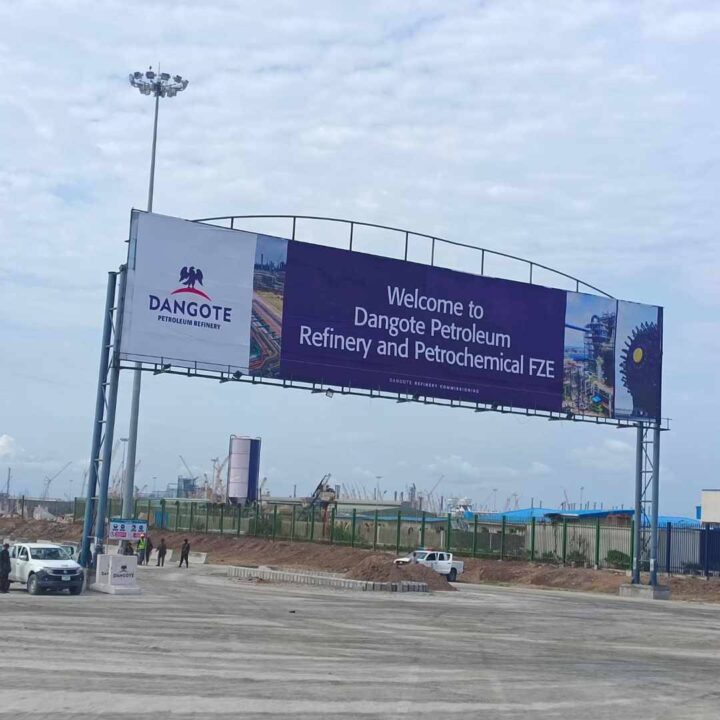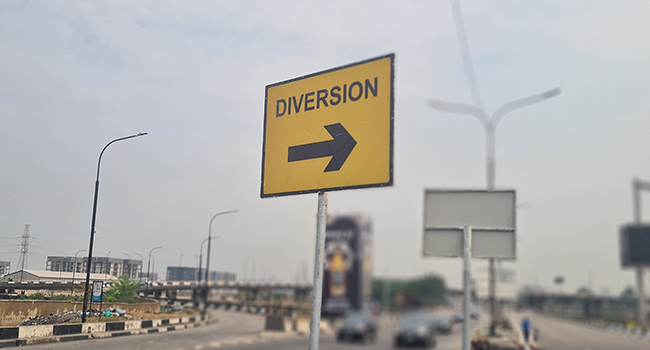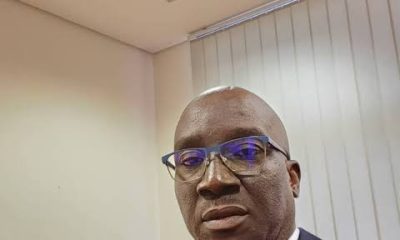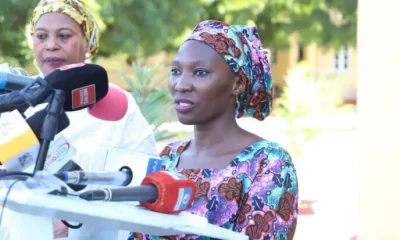Business
Dangote refinery exports first jet fuel cargo to Europe

Dangote Petroleum Refinery has exported its first jet fuel cargo to Europe.
According to a report on May 30 by S&P Global, BP, a British multinational, is presently transporting its first jet fuel cargo to Rotterdam from the refinery.
Quoting four market sources, the publication said this was after being awarded part of a 120,000 metric tonnes (MT) tender offered for the end of May.
According to S&P Global Commodities at Sea (CAS) data, two sources said the Doric Breeze ship loaded 45,000 MT of supplies from the refinery on May 27 — marking the first-ever BP shipment.
In the report, traders said Cepsa, a Spanish refiner, secured a portion of the tender, with the company expected to soon deliver supply to the continent.
Both companies were not available for comments on purchases of jet fuel from the refinery, the publication said.
Since April 8, Dangote has shipped six cargoes of jet fuel/kerosene, all of which have been delivered to Senegal, Togo, or Ghana, according to CAS data.
BP also plans to keep supplying jet fuel from the refinery to the West African market, sources told S&P Global.
“European traders cautioned that fresh jet fuel flows could exacerbate existing weakness as Nigerian supply makes its way into a highly saturated market,” the report said.
‘EXPORT PORTFOLIO TO BE REWORKED’
According to the publication, the refiner’s export portfolio could soon be reshaped as it has pursued ambitious timelines for additional unit ramp-ups.
A representative for Dangote, according to S&P, told Commodity Insights on May 20 that Dangote has exported naphtha, fuel oil and gasoil to markets in Europe, Africa and Asia, however, naphtha exports could soon be curtailed to prepare for petrol production.
“Dangote has been seen pushing around four cargoes of naphtha each month to Europe since April, even though volumes could soon be curbed to boost domestic supplies for gasoline blending, once the plant’s fluid catalytic cracker is operational,” S&P Global said.
Also, the publication said the Nigerian refiner plans to produce ultra-low sulfur diesel eligible for export to Europe by the third quarter.
In its steady-state, the report said the refiner is expected to yield nine percent jet fuel, equating to around 45,000 barrels per day (bpd) at 80 percent utilisation — though early supplies could make Nigeria a net jet fuel exporter for the first time by the fourth quarter.
On May 17, Aliko Dangote, Africa’s richest man, said the refining company will begin producing diesel and petrol in June.
Business
31 electricity towers affected as vandals destroy transmission lines in Edo communities

The Transmission Company of Nigeria (TCN) says vandals in Benin, Edo state, have destroyed 31 transmission towers.
In a statement on Friday, Ndidi Mbah, TCN’s director of public affairs, confirmed that vandals attacked transmission towers in Okada and Ofosu communities along the 330kV Benin-Egbin and Benin-Omotosho transmission lines.
Mbah said the vandalised towers, which suffered significant damage with critical components removed earlier in November, were discovered by TCN linesmen during a routine patrol.
“A total of 31 towers were affected in this incident,” she said.
“TCN engineers from the Benin Sub-Region have initiated repairs to prevent the collapse of the affected towers and to avoid disruption of bulk power supply.”
‘AHOADA-YENAGOA LINE UNDER REPAIR TARGETED BY VANDALS’
Mbah also said its Ahoada-Yenagoa 132kV line, which was under repair following a previous attack, was once again targeted by vandals.
The TCN spokesperson confirmed that the attack, which occurred on November 19, affected towers 29 to 31 and resulted in the theft of approximately one-third of the conductor.
On August 14, TCN announced that Bayelsa state would face a prolonged power outage following the destruction of 13 transmission towers along the Ahoada-Yenagoa 132kV double circuit transmission line by vandals.
The transmission company, on October 29, reported that 65 percent of the damaged transmission towers had been repaired.
The company said 17 transmission towers had been successfully erected, with work continuing on the remaining three.
“A team of TCN engineers, led by Engr. Emmanuel Akpa, General Manager of the Port Harcourt Region, has conducted an inspection of the site,” the statement reads.
“Preliminary findings indicate that the incident occurred at night. In an attempt to prevent further theft while repair arrangements are being made, local security has been engaged at Ula Ikata in Ahoada East LGA to secure the site until repairs are completed.
“Additionally, the line will be energized from the Ahoada end as a preventive measure.”
Mbah added that efforts are underway to replace the stolen 250mm conductor.
Despite challenges posed by difficult terrain and flooding, she said the restringing of the Ahoada-Yenagoa 132kV line is approximately 85 percent complete.
The public relations officer stressed that the incidents underscore the urgent need to address the growing problem of vandalism and theft, which continue to affect Nigeria’s power infrastructure.
She urged the public to support efforts to tackle such criminal acts, which have hindered the expansion and stability of the national grid.
Mbah also called on security operatives and local communities to remain vigilant in protecting power infrastructure in their areas as TCN intensifies its efforts to safeguard its installations.
Business
NCAA issues aerodrome certification for Lagos, Abuja international airports

The Nigeria Civil Aviation Authority (NCAA) has issued Aerodrome Certification for Murtala Muhammed International Airport in Lagos and Nnamdi Azikiwe International Airport in Abuja.
This recertification is a significant achievement, highlighting the ongoing improvements in the safety standards of Nigeria’s international airports.
The announcement was conveyed via a post on the official X (formerly Twitter) account of the Federal Airports Authority of Nigeria (FAAN) on Friday.
The Aerodrome Certificates were formally presented to the Managing Director/Chief Executive of FAAN, Mrs. Olubunmi Kuku, by the Acting Director General of the NCAA, Capt. Chris Najomo.
“@NigeriaCAA just issued Aerodrome Certification for the Murtala Muhammed International Airport Lagos and the Nnamdi Azikiwe Airport Abuja. The recertification is a major boost and attestation to the continued improvements of the safety standard of our Airports,” the tweet read in part.
The certification confirms that Lagos and Abuja airports adhere to the strict safety, operational, and technical standards of the International Civil Aviation Organization (ICAO). This milestone is anticipated to enhance trust among domestic and international airlines, strengthening Nigeria’s standing in global aviation.
Business
Lagos state government plans traffic diversion in Ikeja for 10km Capital City Race today

The Lagos State Government has announced plans for a traffic diversion to accommodate the 10km Capital City Race scheduled for Saturday, November 23, 2024.
The race, which runs between 5:00 AM and 11:00 AM, will affect several major roads in the Ikeja axis, requiring motorists to explore alternative routes during the event.
A statement published on the official X (formerly Twitter) account of the Lagos State Commissioner for Transportation, Oluwaseun Osiyemi, on Friday, highlighted the affected routes.
These include Shoprite Alausa, Billings Way, Kudirat Abiola Way, Opebi Link Bridge, Allen Avenue, Adeniyi Jones, and Oba Akran Avenue.
The race will conclude at the Police College Sports Secretariat/Gym. Junctions and intersections along these roads will be temporarily blocked and manned by officials from the Lagos State Traffic Management Authority (LASTMA), the Nigeria Police Force (NPF), the Federal Road Safety Corps (FRSC), and the Lagos State Neighborhood Corps (LSNC) to ensure a smooth event.
“The Lagos State Government has announced that traffic will be diverted to accommodate the maiden edition of the 10-kilometer Capital City Race between 5:00 am and 11.00 am tomorrow Saturday, 23rd November, 2024.
“To this end, the following route starting from; Shoprite Alausa Ikeja inwards Billings Way to Kudirat Abiola Way, Opebi Link Bridge, Opebi Glo Tower inward Allen Avenue, Allen Junction, GTBank on Adeniyi Jones, AP Filling Station on Oba Akran Avenue, Samsung Authorized Service Centre to Police College Sports Secretariat/Gym will be partially closed off to vehicular movement.
“Consequently, all junctions and intersections from Shoprite Alausa Ikeja to the destination (Police College Sports Secretariat/Gym) will be blocked with barriers, manned by LASTMA, NPF, FRSC, and LSNC to prevent other road users access to the main race corridor,” the statement read in part.
The Lagos State Commissioner for Transportation urged motorists to remain patient as the road closures are part of the traffic management plan for the event. He added that intersections will be intermittently reopened as the race progresses to minimize inconvenience for road users.
Motorists are advised to plan their movements accordingly and cooperate with traffic officials to ensure the success of the inaugural Capital City Race.
In addition to the planned traffic diversion in Ikeja for the 10km Capital City Race, other traffic diversions are currently in effect across Lagos to accommodate critical infrastructure projects.
The Lagos State Government recently announced a 15-month traffic diversion at Mile 2, which began on November 11, 2024, to facilitate the construction of the new Transport Interchange Terminal. This project aims to integrate rail, bus, water, and non-motorized transport, addressing the city’s growing transportation needs.
The diversion affects Loop 1 on the Apapa-bound lane and Loop 4 on the Badagry-bound lane and will last until February 16, 2026. Motorists are advised to use alternative routes, such as Akinwande Road for Badagry-bound traffic and Durban Road for Apapa-bound traffic, to ease congestion.
Additionally, a three-month traffic diversion on the Marine Bridge, outbound Apapa, commenced on Monday, November 18, 2024. This diversion, set to run until February 25, 2025, is to allow for urgent asphalt repairs overseen by the Federal Ministry of Works.
Motorists heading toward Lagos Island are advised to use the Eko Bridge via Costain Roundabout, while those heading to Ijora Causeway or Iddo can navigate through Ijora 7up or other designated routes.
These diversions are part of ongoing efforts by the Lagos State Government to improve transportation infrastructure while minimizing disruption for road users.
-

 Politics1 week ago
Politics1 week agoOkpebholo fires permanent secretaries, dissolves boards
-

 Business5 days ago
Business5 days agoLagos state government to commence upgrade of major junctions in Ikeja axis, seeks residents’ cooperation
-

 Politics1 week ago
Politics1 week agoDSS operatives arrest man with bags of cash during Ondo guber
-

 Celebrities1 week ago
Celebrities1 week agoDaddy Freeze, Akah Nnani clash over Emmanuel Iren
-

 News7 days ago
News7 days agoNnamdi Emeh: Suspect Facing Charges In Court, Process Independent Of Police Influence
-

 News1 week ago
News1 week agoAlice Loksha, abducted UNICEF nurse, escapes captivity after 6 years
-

 Health1 week ago
Health1 week agoFive ways to rid your home of ants
-

 Politics6 days ago
Politics6 days agoAiyedatiwa takes commanding lead in Ondo guber poll after winning 15 of 18 LGAs


















